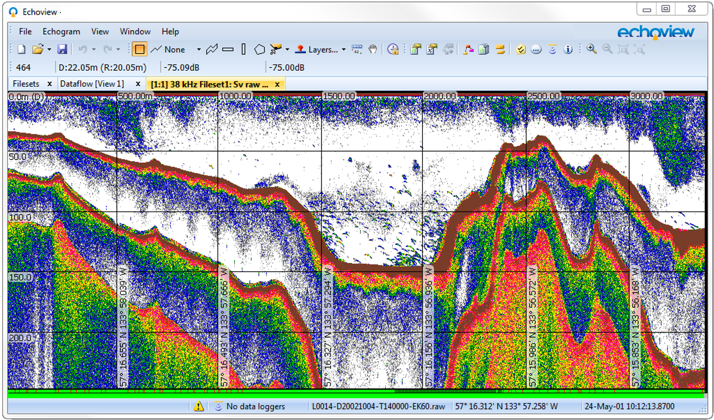| Echoview is a powerful and flexible water acoustic data processing software. After years of development, it has been used by global fishery and environmental scientists as one of the important means of studying fishery resources and marine and freshwater ecological environments. | |||||||||||||||||||
Main functions | |||||||||||||||||||
Fishery Resource Assessment Fishery resource assessment is crucial to the management of marine and freshwater resources.Echoview was originally developed for this purpose.Echoview provides powerful tools, equations and operators for quantitative acoustic data analysis, supporting the most commonly used fishery echo detectors and sonar data formats. ComeBrowse and calibrate data ComeDescribe noise and other distortion data ComeDetect fish or zooplankton groups ComeCalculate the depth of the bottom ComeSet parameters or manually classify acoustic data ComeProcessing acoustic data through multiple analytical variables and multiple angles | Behavior & Ecological Research Using Echoview analysis software allows echo detectors and sonar data to provide unparalleled information at individuals (such as fish, shrimp), groups (such as fish schools, water layers), and intervals (space and/or time). ComeDetect and track target individuals ComeAssessing individual size ComeDetect fish swarms ComeTime and space division of acoustic data ComeData visualization, acoustic and video data synchronization ComeDescribe individuals, groups and intervals from location, morphology, acoustic energy and environment | Habitat classification Acoustic backscattering measurements of the bottom of the water can provide information about the properties of the bottom (such as hard or soft, rough or smooth, sand or gravel) and water depth, Help researchers to better understand the habitat conditions of aquatic animals. ComeJudge and describe primary and secondary bottom echoes ComeBottom features are quantified and simplified by principal component analysis (PCA) ComeClassification of bottom sampling points by K-mean clustering | |||||||||||||||||
 | |||||||||||||||||||
| echo viewSoftware module | |||||||||||||||||||
Echoview software is a modular software that can flexibly select and add various functional modules according to your current and future needs. Core modules (Echoview Essentials) Read data from the sonar device and display an echo map, detect the bottom of the water and define other reference lines, create a bottom of the water 3D digital terrain model, and display the map data.Perform basic quality control, perform data analysis and then export results. Live Viewing module (Live Viewing) Display the echo diagram, cruise trajectory and 3D bottom of the echo sounder in real time. Habitat Classification Substrate analysis and classification of single-beam and split beam data is performed for substrate type identification and habitat mapping, and then output and view classification results.Export data to third-party base type classification software, such as QTC IMPACT and EchoIMPACT. Additional modules: If you want to obtain the following modules, you must have authorization for the Echoview core module. Media module (Media) Automation module (Automation) The user selects the programming language for data processing automation (COM interface is required). Advanced Operators Create a new echo graph from an existing echo graph and then operate on it using advanced operators and algorithms.Used to compare the differences in multiple frequency data, quality control, data classification, etc. Fish Tracking Module School Detection Module Multibeam Fish Tracking Module (Multibeam Fish Tracking) Detection, tracking and analysis of fish individuals in data analysis of single-beam, split beam and multi-beam systems, also include imaging sonar. Multibeam School Detection Module (Multibeam School Detection) In multi-beam system data, detection, tracking and analysis of groups or bubbles are performed. | |||||||||||||||||||
| Origin:Australian Echoview | |||||||||||||||||||